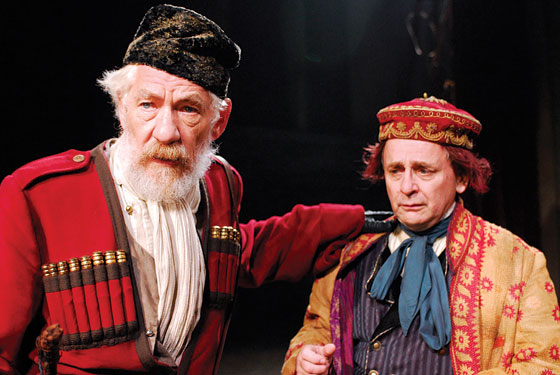
In the interest of public safety, somebody might want to hang a banner outside the Brooklyn Academy of Music: DEPRESSIVES BEWARE would do, or the more traditional ABANDON HOPE, ALL YE WHO ENTER HERE. Sir Ian McKellen and the Royal Shakespeare Company have arrived with a repertory of King Lear and The Seagull, and seeing them on consecutive nights is like getting both barrels from a shotgun loaded with despair.
Sir Trevor Nunn’s grand, gloomy treatment of the plays is no more resonant or original than a half-dozen other revivals around town lately—in fact, parts of some homegrown productions have surpassed it—but lashed together this way, the bleakness of Lear and the sorrow of Chekhov reinforce one another. On a set that resembles a tumbledown opera house, in costumes that wouldn’t be out of place in czarist Russia, feeble human beings again and again get blasted by the gods and the elements (in Lear) and wasted by their heartaches and dried-up dreams (in The Seagull). Life offers no escape for anybody, these plays want you to know. Both Shakespeare’s Edgar and Chekhov’s Nina make explicit the need to learn, above all, how to endure.
But if you’re going to have the entire cosmos pitched against you, it helps to be Ian McKellen. That he is the best part of these shows says something about the range and quality of his performances, and something more about the unevenness of the actors around him. On certain nights of The Seagull, he plays Sorin, the aging brother of the famous actress Arkadina, a retiree with puffy white curls and aimless good cheer. As he dodders (or is wheeled) around his country estate, trying to recall what he meant to do with his life, McKellen offers little flashes of the wit that gives his Hollywood roles like Gandalf and Magneto their buoyancy. “Even when I was a youngster, I used to look like a homeless alcoholic, so women were put off,” he says with the kind of twinkle that goes a long way in a show that unwisely depicts the languor of lovesick Russians languorously.
Lear finds McKellen working at the opposite, outsize extreme. As the doomed old king, he captures what some recent Lears like Kevin Kline couldn’t convey (because the actor was too young and ill-suited for the role) and Christopher Plummer and Alvin Epstein didn’t get the chance to convey (because their productions were so limited): the majesty of the man. Nunn begins the evening with a kind of Black Mass—crashing organ, a glum procession, and the king’s strange, silent benediction to the crowd. (The production is obsessed with religion: Somebody is forever kneeling down or reaching up to beseech the aid of the gods. This being the most nihilistic play ever written, that help is not forthcoming.)
Nunn’s opening gambit turns out to be a sign of trouble. He has taken a maximalist approach, unspooling a full three and a half hours of Shakespeare plus some flourishes all his own. That is—and I say this as one whose devotion to the play normally knows no limits—too much King Lear. How many of the Fool’s unfunny 400-year-old jokes do we really need to hear? Couldn’t we just stipulate that Poor Tom is a lunatic and skip the indecipherable gibbering? Combined, the noisy freak-outs obscure the middle of McKellen’s performance—except, of course, the part where he goes full-frontal, ten seconds that are now the talk of three continents.
Though McKellen’s castmates have a tendency to go flying over the top, some do fine work, like Philip Winchester’s dashing and wicked Edmund in Lear and Monica Dolan’s snuff-and-vodka-pounding Masha in The Seagull. Still, the most affecting moments are the quiet stretches just before Lear’s demise, when he begins to understand the terrible lessons he’s learned on the heath. “I am a very foolish fond old man,” he tells Cordelia with a regretful smile. Later, as he cradles her dead body, McKellen takes Lear’s five repeated “Never”s with aching slowness, as ten distinct syllables. To me, anyway, it sounded as though Lear hadn’t grasped until that moment what the term signifies, the ultimate finality it implies—making this a darker take than most. In other words, McKellen has found a way to wrap up this legendarily bleak play with a fresh new dose of bleakness. I congratulate him on the insight, and wonder if he can spot me a Zoloft.
King Lear
By William Shakespeare.
The Seagull
By Anton Chekhov. Harvey Theater, Brooklyn Academy of Music. Through September 30.
E-mail: theatercritic@newyorkmag.com.